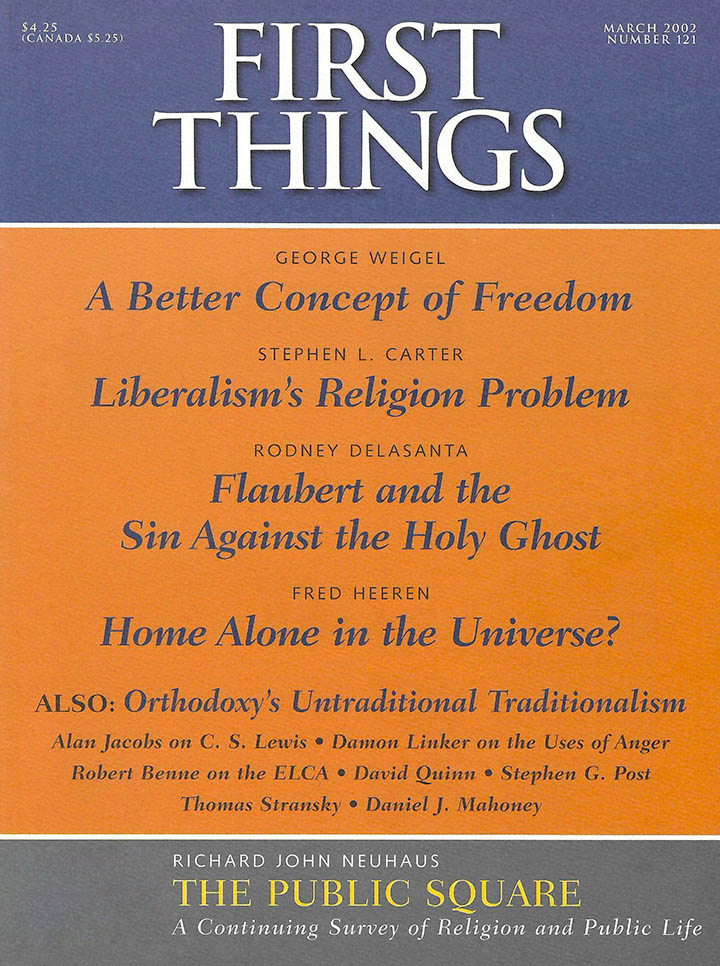It has been a while since the Congregation for the Doctrine of the Faith issued Dominus Iesus (The Lord Jesus) in September 2000, but the ecumenical bruises still show. In the general media, most of the headlines were variations on “Rome Says Catholicism is Only True Church.” I discussed and defended Dominus Iesus in these pages (see “To Say Jesus is Lord,” November 2000), and also noted that it was welcomed by some Protestants as a clear affirmation of core Christian doctrines. At the same time, and in retrospect, it is evident that some misunderstandings might have been avoided. Father Jared Wicks of the Gregorian University in Rome writes in Ecumenical Trends that the document needs to be read alongside the 1995 encyclical Ut Unum Sint (That They May be One). “It is not the case,” says the encyclical, “that beyond the boundaries of the Catholic community there is an ecclesial vacuum.” Elements of God’s justifying and sanctifying grace are to be found there, and “To the extent that these elements are found in the other Christian Communities, the one Church of Christ is effectively present in them.” There can be only one Church of Christ because there is only one Christ, and the Church is, according to the New Testament, his body. The teaching of the Second Vatican Council is that that one Church “subsists in” the Catholic Church, but the Catholic Church does not exhaust the reality of the one Church of Christ.
The Res Tantum
Fr. Wicks puts the crucial point this way: “In order to be heard more clearly by members of the other Christian Churches and communities, Catholic ecumenists can well make explicit something not said in Dominus Iesus . This is that being or not being ‘Church in the proper sense’ stands in the realm of the sacramental and structural expression of ecclesiality and mediation of salvation in the world. Here, the others know well our Catholic convictions, both those concerning fullness of mediatory means in our Church, however imperfectly we are actually formed and sanctified by them, and those about the defectus (flaws, lacks) found in their mediatory structures and sacraments. But the mediations of sanctification in Christ which the ecclesial communities do cherish and actualize, as in baptism, proclamation of the gospel of salvation, etc., do not mediate to them a defective justification and salvation. Using sacramental terminology, the res tantum is given whole and entire, namely, union with Christ, life in the Spirit, and access to the Father.”
I am regularly asked why, if the Catholic Church teaches that it is not necessary to salvation, one should become a Catholic. There are many possible responses to that question. The Second Vatican Council’s constitution on the Church, Lumen Gentium (Light to the Nations), says that if one believes that the Catholic Church is what she claims to be, then one is bound in conscience to enter into and remain in full communion with her. In other words, it is then a matter of salvation. The Catholic Church may be defined as the Church of Jesus Christ most fully and rightly ordered through time. Since to be a Christian means living in obedience to Christ, and since Christ instituted the apostolic ordering of his Church as it is to be found uniquely in the Catholic Church, it follows that obedience to Christ entails being and remaining in full communion with the Catholic Church. It also follows that not being in full communion is disobedience to Christ. If , that is, one believes that the Catholic Church is what she claims to be.
As I say, there are many other possible, and important, answers to the question why one should be a Catholic, but that is the one that goes to the heart of the matter. Let me anticipate another frequently asked question, Why not Orthodoxy? The communion between the Orthodox Church and the Catholic Church is so close that it might be said that the only thing that is lacking for full communion is full communion. But, if one believes that Christ’s institution of his one Church includes the Petrine Ministry, then it follows that it is necessary to be in full communion with the bishops, the successors of the apostles, who are in full communion with the Bishop of Rome, the successor of Peter. If one believes none of these things, there may be other good reasons for becoming a Catholic, but it would seem that they are not binding in conscience. Of course, one is bound in conscience to try to discern whether these things are true, and to act on the truth that one is able to discern.
Now I have gone quite beyond Fr. Wicks’ helpful clarification of Dominus Iesus . And the twists and turns, the eccentric starts and stops, the dead-ends and disturbing discoveries in following the Spirit’s lead are not so neatly logical or doctrinally deductive as my brief response may suggest. As with any life-defining decision, it is also the case that the heart has its reasons of which reason does not know. But this is intended as no more than a brief response to questions often asked”questions that are not, you will perhaps agree, unrelated to Dominus Iesus , to what it means to say that Jesus is Lord.
The Church’s Answer to the World (ft. Carter Griffin)
In the latest installment of the ongoing interview series with contributing editor Mark Bauerlein, Fr. Carter Griffin…
The Lost Art of Saying “No”
Conservative pundit Matt Walsh recently contended that “we have to recapture the long-lost art of saying ‘no.’”…
Faith Returns to the Public Square
Pastors, pundits, and politicians gathered in Phoenix last Sunday to remember Charlie Kirk. Seventy thousand people filled…

